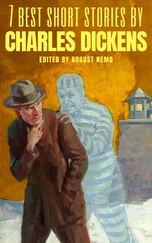Charles Dickens - Pearl-Fishing; Choice Stories from Dickens' Household Words; First Series
Здесь есть возможность читать онлайн «Charles Dickens - Pearl-Fishing; Choice Stories from Dickens' Household Words; First Series» — ознакомительный отрывок электронной книги совершенно бесплатно, а после прочтения отрывка купить полную версию. В некоторых случаях можно слушать аудио, скачать через торрент в формате fb2 и присутствует краткое содержание. ISBN: , Издательство: Иностранный паблик, Жанр: foreign_prose, на английском языке. Описание произведения, (предисловие) а так же отзывы посетителей доступны на портале библиотеки ЛибКат.
- Название:Pearl-Fishing; Choice Stories from Dickens' Household Words; First Series
- Автор:
- Издательство:Иностранный паблик
- Жанр:
- Год:неизвестен
- ISBN:http://www.gutenberg.org/ebooks/49927
- Рейтинг книги:5 / 5. Голосов: 1
-
Избранное:Добавить в избранное
- Отзывы:
-
Ваша оценка:
- 100
- 1
- 2
- 3
- 4
- 5
Pearl-Fishing; Choice Stories from Dickens' Household Words; First Series: краткое содержание, описание и аннотация
Предлагаем к чтению аннотацию, описание, краткое содержание или предисловие (зависит от того, что написал сам автор книги «Pearl-Fishing; Choice Stories from Dickens' Household Words; First Series»). Если вы не нашли необходимую информацию о книге — напишите в комментариях, мы постараемся отыскать её.
Pearl-Fishing; Choice Stories from Dickens' Household Words; First Series — читать онлайн ознакомительный отрывок
Ниже представлен текст книги, разбитый по страницам. Система сохранения места последней прочитанной страницы, позволяет с удобством читать онлайн бесплатно книгу «Pearl-Fishing; Choice Stories from Dickens' Household Words; First Series», без необходимости каждый раз заново искать на чём Вы остановились. Поставьте закладку, и сможете в любой момент перейти на страницу, на которой закончили чтение.
Интервал:
Закладка:
Charles Dickens
Pearl-Fishing; Choice Stories from Dickens' Household Words; First Series
I.
Loaded Dice
SEVERAL years ago, I made a tour through some of the Southern Counties of England with a friend. We travelled in an open carriage, stopping for a few hours a day, or a week, as it might be, wherever there was anything to be seen; and we generally got through one stage before breakfast, because it gave our horses rest, and ourselves the chance of enjoying the brown bread, new milk, and fresh eggs of those country road-side inns, which are fast becoming subjects for archæological investigation.
One evening my friend said, “To-morrow we will breakfast at T – . I want to inquire about a family named Lovell, who used to live there. I met the husband and wife, and two lovely children, one summer at Exmouth. We became very intimate, and I thought them particularly interesting people, but I have never seen them since.”
The next morning’s sun shone as brightly as heart could desire, and after a delightful drive, we reached the outskirts of the town about nine o’clock.
“Oh, what a pretty inn!” said I, as we approached a small white house, with a sign swinging in front of it, and a flower-garden on one side.
“Stop, John,” cried my friend, “we shall get a much cleaner breakfast here than in the town, I dare say; and if there is anything to be seen there, we can walk to it;” so we alighted, and were shown into a neat little parlor, with white curtains, where an unexceptionable rural breakfast was soon placed before us.
“Pray do you happen to know anything of a family called Lovell?” inquired my friend, whose name, by the way, was Markham. “Mr. Lovell was a clergyman.”
“Yes, Ma’am,” answered the girl who attended us, apparently the landlord’s daughter, “Mr. Lovell is the vicar of our parish.”
“Indeed! and does he live near here?”
“Yes, Ma’am, he lives at the vicarage. It’s just down that lane opposite, about a quarter of a mile from here; or you can go across the fields, if you please, to where you see that tower; it’s close by there.”
“And which is the pleasantest road?” inquired Mrs. Markham.
“Well, Ma’am, I think by the fields is the pleasantest, if you don’t mind a stile or two; and, besides, you get the best view of the Abbey by going that way.”
“Is that tower we see part of the Abbey?”
“Yes, Ma’am,” answered the girl, “and the vicarage is just the other side of it.”
Armed with these instructions, as soon as we had finished our breakfast we started across the fields, and after a pleasant walk of twenty minutes we found ourselves in an old churchyard, amongst a cluster of the most picturesque ruins we had ever seen. With the exception of the gray tower, we had espied from the inn, and which had doubtless been the belfry, the remains were not considerable. There was the outer wall of the chancel, and the broken step that had led to the high altar, and there were sections of aisles, and part of a cloister, all gracefully festooned with mosses and ivy; whilst mingled with the grass-grown graves of the prosaic dead, there were the massive tombs of the Dame Margerys and the Sir Hildebrands of more romantic periods. All was ruin and decay, but such poetic ruin! such picturesque decay! And just beyond the tall gray tower, there was the loveliest, smiling, little garden, and the prettiest cottage, that imagination could picture. The day was so bright, the grass so green, the flowers so gay, the air so balmy with their sweet perfumes, the birds sang so cheerily in the apple and cherry trees, that all nature seemed rejoicing.
“Well,” said my friend, as she seated herself on the fragment of a pillar, and looked around her, “now that I see this place, I understand what sort of people the Lovells were.”
“What sort of people were they?” said I.
“Why, as I said before, interesting people. In the first place, they were both extremely handsome.”
“But the locality had nothing to do with their good looks, I presume,” said I.
“I am not sure of that,” she answered; “when there is the least foundation of taste or intellect to set out with, the beauty of external nature, and the picturesque accidents that harmonize with it, do, I am persuaded, by their gentle and elevating influence on the mind, make the handsome handsomer, and the ugly less ugly. But it was not alone the good looks of the Lovells that struck me, but their air of refinement and high breeding, and I should say high birth – though I know nothing about their extraction – combined with their undisguised poverty and as evident contentment. Now, I can understand such people finding here an appropriate home, and being satisfied with their small share of this world’s goods; because here the dreams of romance writers about Love in a Cottage might be somewhat realized; poverty might be graceful and poetical here; and then, you know, they have no rent to pay.”
“Very true,” said I; “but suppose they had sixteen daughters, like a half-pay officer I once met on board a steam-packet?”
“That would spoil it certainly,” said Mrs. Markham; “but let us hope they have not. When I knew them they had only two children, a boy and a girl called Charles and Emily; two of the prettiest creatures I ever beheld!”
As my friend thought it yet rather early for a visit, we had remained chattering in this way for more than an hour, sometimes seated on a tomb-stone, or a fallen column; sometimes peering amongst the carved fragments that were scattered about the ground, and sometimes looking over the hedge into the little garden, the wicket of which was immediately behind the tower. The weather being warm, most of the windows of the vicarage were open and the blinds were all down; we had not yet seen a soul stirring, and were wondering whether we might venture to present ourselves at the door, when a strain of distant music struck upon our ears. “Hark!” I said, “how exquisite! It was the only thing wanting to complete the charm.”
“It’s a military band, I think,” said Mrs. Markham, “you know we passed some barracks before we reached the Inn.”
Nearer and nearer drew the sound, solemn and slow; the band was evidently approaching by the green lane that skirted the fields we had come by. “Hush,” said I, laying my hand on my friend’s arm, with a strange sinking of the heart; “they are playing the Dead March in Saul! Don’t you hear the muffled drums? It’s a funeral, but where’s the grave?”
“There,” said she, pointing to a spot close under the hedge where some earth had been thrown up; but the aperture was covered with a plank, probably to prevent accidents.
There are few ceremonies in life at once so touching, so impressive, so sad, and yet so beautiful, as a soldier’s funeral! Ordinary funerals with their unwieldy hearses and feathers, and the absurd looking mutes, and the “inky cloaks” and weepers of hired mourners, always seem to me like a mockery of the dead; the appointments border so closely on the grotesque; they are so little in keeping with the true, the only view of death that can render life endurable! There is such a tone of exaggerated, forced, heavy, over-acted gravity about the whole thing, that one had need to have a deep personal interest involved in the scene, to be able to shut one’s eyes to the burlesque side of it. But a military funeral, how different! There you see death in life and life in death! There is nothing over-strained, nothing overdone. At once simple and silent, decent and decorous, consoling, yet sad. The chief mourners, at best, are generally true mourners, for they have lost a brother with whom “they sat but yesterday at meat;” and whilst they are comparing memories, recalling how merry they had many a day been together, and the solemn tones of that sublime music float upon the air, we can imagine the freed and satisfied soul wafted on those harmonious breathings to its Heavenly home; and our hearts are melted, our imaginations exalted, our faith invigorated, and we come away the better for what we have seen.
Читать дальшеИнтервал:
Закладка:
Похожие книги на «Pearl-Fishing; Choice Stories from Dickens' Household Words; First Series»
Представляем Вашему вниманию похожие книги на «Pearl-Fishing; Choice Stories from Dickens' Household Words; First Series» списком для выбора. Мы отобрали схожую по названию и смыслу литературу в надежде предоставить читателям больше вариантов отыскать новые, интересные, ещё непрочитанные произведения.
Обсуждение, отзывы о книге «Pearl-Fishing; Choice Stories from Dickens' Household Words; First Series» и просто собственные мнения читателей. Оставьте ваши комментарии, напишите, что Вы думаете о произведении, его смысле или главных героях. Укажите что конкретно понравилось, а что нет, и почему Вы так считаете.












